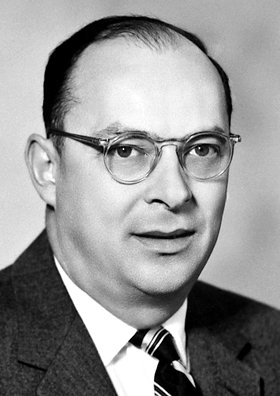John Bardeen, American physicist and engineer, Nobel Prize laureate (d. 1991)
John Bardeen (; May 23, 1908 – January 30, 1991) was an American engineer and physicist. He is the only person to be awarded the Nobel Prize in Physics twice: first in 1956 with William Shockley and Walter Brattain for the invention of the transistor; and again in 1972 with Leon N Cooper and John Robert Schrieffer for a fundamental theory of conventional superconductivity known as the BCS theory.The transistor revolutionized the electronics industry, making possible the development of almost every modern electronic device, from telephones to computers, and ushering in the Information Age. Bardeen's developments in superconductivity—for which he was awarded his second Nobel Prize—are used in nuclear magnetic resonance spectroscopy (NMR) and medical magnetic resonance imaging (MRI).
Born and raised in Wisconsin, Bardeen received a PhD in physics from Princeton University. After serving in World War II, he was a researcher at Bell Labs, and a professor at the University of Illinois. In 1990, Bardeen appeared on Life magazine's list of "100 Most Influential Americans of the Century."

1908May, 23
John Bardeen
Choose Another Date
Events on 1908
- 30Jan
Jan C. Smuts
Indian pacifist and leader Mohandas Karamchand Gandhi is released from prison by Jan C. Smuts after being tried and sentenced to two months in jail earlier in the month. - 17Sep
Orville Wright
The Wright Flyer flown by Orville Wright, with Lieutenant Thomas Selfridge as passenger, crashes, killing Selfridge, who becomes the first airplane fatality. - 27Sep
Ford Piquette Avenue Plant
The first production of the Ford Model T automobile was built at the Ford Piquette Avenue Plant in Detroit, Michigan. - 1Oct
Ford Model T
Ford puts the Model T car on the market at a price of US$825. - 14Oct
Detroit Tigers
The Chicago Cubs defeat the Detroit Tigers, 2-0, clinching the World Series; this would be their last until clinching the 2016 World Series.

 English
English  español
español  français
français  português
português  русский
русский  العربية
العربية  简体中文
简体中文